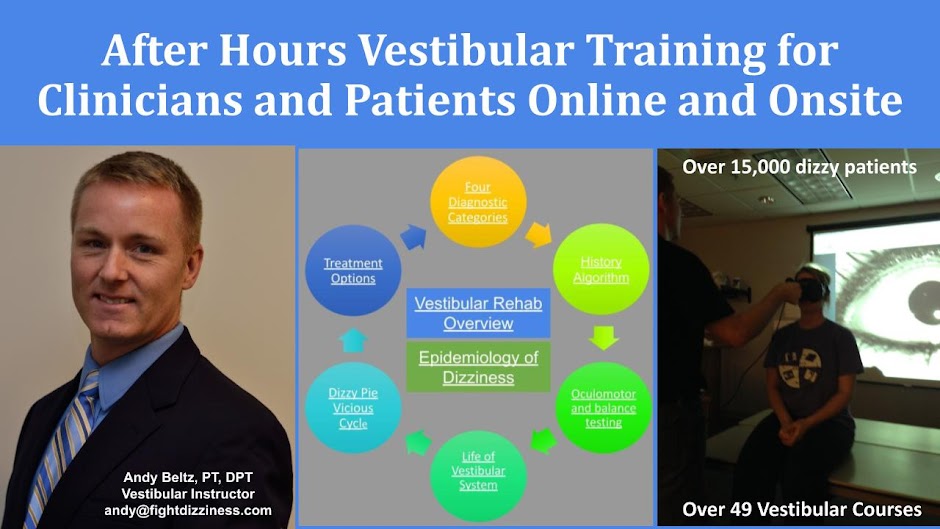I am currently taking a class on diagnostic imaging. I am going to post my hypothetical response to a patient for our discussion group here, but before I do, I want to underscore the value of a few key elements.
#1. When it comes to diagnosing dizziness, I want to emphasize the big three. When it comes to helping clients figure out why they are dizzy, I always say "The Big Three is Key." The big three are triggers, timing, and nystagmus. Add in whether or not hearing loss is present, and we are really moving in the right direction for helping confirm the cause of dizziness. Never underestimate the value of a high quality thorough history and bedside exam. Also, if a client is having spells that are not present at the time of the clinical visit, have them video their eyes during an attack! So much valuable information can be gained by doing so!
Here is a link to the American College of Radiology's recommendations regarding when to order imaging for people who have sudden onset of dizziness and/or hearing loss. https://acsearch.acr.org/docs/69488/Narrative/
#2. "Normal" VNGs completed on individuals who are asymptomatic only provide insight regarding performance of the inner ear and brain at the time the VNG was performed. Using a cell phone to record eye movements during spells should be encouraged when VNG results do not provide answers regarding why a client is dizzy. Caution should be exercised before telling clients they have no inner ear or brain problems simply because the VNG was "normal" in the absence of symptoms.
#3. Abnormal results on MRIs may or may not have meaning. Please see my hypothetical response below addressed to an individual with low back pain:
You are seeing a
49 yo patient with a 4 week history of low back pain and they are very upset
because their physician did not order an MRI. Outline a potential
response to this patient. Can you imagine a scenario where the patient's
frustration is justified?
I
understand your concern for wanting an MRI. However, according to the
American College of Radiology guidelines, an MRI is not warranted right now
because you have no red flags. If you had a traumatic onset, a history of
spinal surgery, osteoporosis, a history of cancer, suspicion of cancer, infection,
weakness or changes in your bowel/bladder, your Physician would probably be
more likely to order an MRI and your frustration would certainly warrant a
phone call from myself to your Physician. These recommendations are based
upon studies of thousands of different individuals combined with collaboration
of experts with years of experience. Also, please consider a study done
in 2015. The study was done on 1211 asymptomatic subjects. 87.5%
had significant disc bulging, but no symptoms!(1). Another study on 67
individuals found about ⅓ of asymptomatic individuals to have abnormal findings
(2). These individuals were surveyed over a seven year period and the
abnormal findings were unable to predict which individuals would develop pain
(3). What matters most is our clinical findings at this time. For
now, I believe we can help your back pain with therapy.
1.
Nakashima H, Yukawa Y, Suda K, Yamagata M, Ueta
T, Kato F. Abnormal findings on magnetic resonance images of the cervical
spines in 1211 asymptomatic subjects. Spine (Phila Pa 1976).
2015;40(6):392-398.
2.
Boden SD, Davis DO, Dina TS, Patronas NJ, Wiesel
SW. Abnormal magnetic-resonance scans of the lumbar spine in asymptomatic
subjects. A prospective investigation. J Bone Joint Surg Am 1990;72:403- 8
3.
Borenstein DG, O'Mara JW, Jr., Boden SD, Lauerman
WC, Jacobson A, Platenberg C et al. The value of magnetic resonance imaging of
the lumbar spine to predict low-back pain in asymptomatic subjects : a
seven-year follow-up study. J Bone Joint Surg Am 2001;83-A:1306-11.

No comments:
Post a Comment